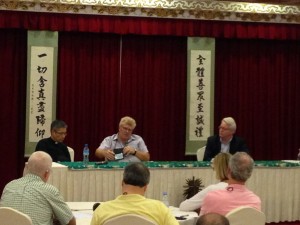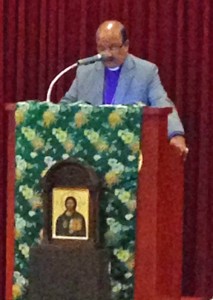Theological Context and Mission Challenges in Hong Kong and Pakistan
In the afternoon we heard from the Reverend Peter Koon, Principal Secretary of the Anglican Church in Hong Kong, and Dr. Gareth Jones, Principal of Ming Hua Seminary, the Anglican Church’s theological college in Hong Kong. They were followed by the Most Reverend Samuel Azariah, Bishop of Raiwind and Moderator of the Church of Pakistan.
Peter was fairly brief, wanting to raise one particular challenge related to the complexities of life in “One Country with Two Systems.” That is, the Church is not used to engaging in the affairs of politics, and in this environment there is a great deal of popular controversy over Hong Kong’s future relationship with China; Peter hoped the growing relationship with the Episcopal Church would give them some guidance in connecting the Gospel to the political questions of Hong Kong’s present and future.
Gareth spoke of the challenges of training lay and clergy leadership for a Church that was changing rapidly. He acknowledged the same cultural difficulties as exist in Taiwan, the context of Buddhism, Taoism and Confucianism, but also pointed out that Chinese Christians have a different way of looking at the Bible than the West. He drew a comparison with an African reading of the Adam and Eve story, in which the main focus is not on the problem of good and evil, but rather on the sin of breaking fellowship. According to this reading, God made Adam and Eve to be in communion with him; when God walks in the garden “in the cool of the day” He is expecting the companionship of His human creatures, but instead they hide themselves. So the dominant question is not the second question God asks (2:11), “Who told you that you were naked?” but rather the first question (2:9) “Where are you?”
At Ming Hua, the model for the school is the original companionship of the Garden, between God and man, and among human beings; the crises of our faith originate in two gardens, Eden and Gethsemane, in which God experiences the abandonment of His creatures, from the point of view of the Father and the Son. We receive mercy and healing in the community of the Church.
This means that formation is an intensive experience of community; students begin every day with communal Bible study, then move to academic classes, then to Morning Prayer which is the “hinge” of the day. This is followed by lunch with the principal. The afternoon is reflection on “priestcraft” mission and liturgy. The emphasis throughout is on training Anglican Catholic clergy, not generic Christian pastors with an Anglican veneer., continually asking the question, What does it mean to be Catholic and Reformed? There is an emerging emphasis on training lay leadership in the same context, together with the ordinands.
Bishop Azariah spoke of the challenge for mission in Pakistan, the third largest Muslim state in the world, 189 million people of whom 1.5% are Christian, in a country the size of the state of California. Radical Islam is gaining ground, “a religion looking for a state.” The Anglican presence in Pakistan is isolated from the rest of the Anglican Church, having not had a substantial relationship with the global Communion for many years, but they are now seeking partnerships. They need to learn the skills of development that the Western Churches appear to have. Co-operation with other churches within Pakistan is constantly hampered by mutual mistrust.
The most striking thing about Bishop Azariah’s presentation was the clear danger his people face every day simply living out their faith. They are coming up on the anniversary of the church bombing in Peshawar, in which 175 people, mainly mothers and children, were killed by a suicide bomber. He will visit the church on that day. When asked how he does it, he simply smiled and says, “Well, that is our Cross; so we pick it up and walk. The question you must ask is, What is yours?”
Lessons for your Bishop:
There were two kinds of passion going on here today: one was the thoughtful academic strategy of Gareth, committed to training leadership for the Gospel; the other was the heartfelt commitment of missionaries in the field, facing humiliation, rejection, and even death, for the sake of the Gospel. I am especially struck by the missionary approach I see in all the clergy here, embodied in Bishop David Lai: their outreach is broad, they welcome everyone into their ministries, their kindergartens, their schools. They are the most consistently loving extended community of Christians and Christian leaders I have ever seen; and at the same time, they are absolutely clear on the Gospel of Grace— what it is, what it isn’t, how it challenges the world around them— above all the importance of what Christ has to offer, nothing less than new life in a context soaked in the fear of death. This combination of passion and love, gentleness and clarity for the sake of Jesus, is one thing that I have been deeply inspired by in this day, as well as throughout my visit so far.
The second lesson would be the importance of Biblical formation of all clergy and lay leadership. It is clear to me this is different than mere Biblical literacy. I am reminded of Paul’s beautiful charge in Colossians 3:16, “Let the word of Christ dwell in you richly, teaching and admonishing one another in all wisdom.” What would it mean for us in Pittsburgh to make this commitment of Biblical formation, across the board, in ever parish, for our lay leaders and clergy, for all of us, to be in deep and regular study, soaking in the word of God that it might dwell in us richly?
I think these two lessons are intimately related. In fact, I don’t think we can approach the goals I hope for without them— the goals of a truly public Gospel, deeply missional communities, and thriving leadership formation. What would our lives and mission look like, in Pittsburgh, if we let this godly gentleness, passion, clarity, care for one another and the world, and the indwelling of the Word, really take possession of our minds and hearts? I think this is something God would really like us to find out!


